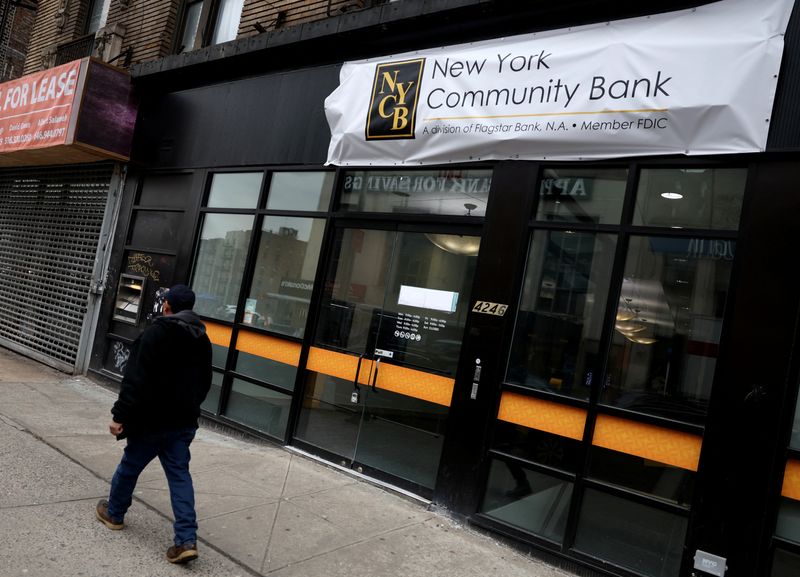(Reuters) - New York Community Bancorp (NYSE:NYCB) replaced its CEO,disclosed a $2.4 billion goodwill impairment hit and said it had identified "material weaknesses" in internal controls tied to its review of loans, sending its shares tumbling on Friday.
On Jan. 31, the lender cut its dividend and recorded a surprise quarterly loss, prompting a series of downgrades and sparking an over 60% drop in shares.
Here is a timeline of key events surrounding NYCB:
Date Development
March NYCB subsidiary Flagstar Bank enters agreement with
19, 2023 U.S. regulators to buy deposits and loans from
failed lender Signature Bank (OTC:SBNY).
Jan. 31 NYCB shares slump 37.7% after the lender slashed
its dividend by 70% and posted a surprise loss for
the fourth quarter, pressured by stress in its CRE
portfolio.
Moody's (NYSE:MCO) places all long-term and short-term ratings
as well as assessments of NYCB and its subsidiary
Flagstar Bank on review for a downgrade.
Feb. 1 NYCB shares tumble another 11.1%, dragging down
U.S. regional bank stocks amid a frenzied selling
in banking shares. Bank says it believes stock
price will recover as the market sees "value
enhancing actions" being taken.
Feb. 2 The bank's shares enjoy a reprieve, inching up 5%
after sinking 45% in the past two sessions. After
market close, Fitch downgrades long-term issuer
default ratings for NYCB and its subsidiary
Flagstar Bank.
Feb. 5 Shares of NYCB resume descent. NYCB confirms its
chief risk officer Nick Munson had left the company
after a report from the Financial Times.
Feb. 6 U.S. Treasury Secretary Janet Yellen tells a House
Financial Services Committee hearing that she was
concerned about looming CRE stresses on banks, but
believed the situation is manageable with
assistance from banking regulators.
Shareholders file a class action suit accusing the
regional bank of defrauding them by failing to
disclose that it would set aside more money for
credit losses.
Moody's downgrades all long-term and some
short-term issuer ratings of NYCB as well as
assessments of its subsidiary Flagstar Bank to junk
and warned of further downgrades.
NYCB says total deposits rose slightly to $83
billion as of Feb 5. compared to $81.4 billion at
the end of 2023. Adds that it is in the process of
bringing in a new chief risk officer and chief
audit executive.
Feb. 7 Analysts express concerns about "governance risks",
citing the bank's choice to not disclose the
departure of key executives earlier, but cheer the
strong liquidity position.
NYCB names banking veteran Alessandro DiNello as
its executive chairman and vowed to cut down the
lender's exposure to the troubled CRE segment.
Feb. 8 Morningstar DBRS downgrades NYCB's credit rating to
"BBB" from "BBB (high)," citing the lender's
"outsized" exposure to commercial real estate loans
compared to its peers.
Feb. 9 Top executives of the bank, including newly
appointed executive chairman, disclose they bought
stakes in NYCB, helping its stock rally.
Names
Feb DiNello as CEO and revises
29 fourth-quarter loss to $2.7 billion, more than 10
times what it previously stated. Identifies
material weaknesses in the company's internal

controls" and delays annual report.
Sources: Company statements, conference call, media reports